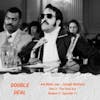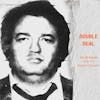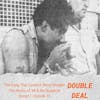
Disorganized Crime - Raymond Patriarca - The Early Days

Raymond L.S. Patriarca is infamous in his role as the Boss of the New England Mafia for nearly 30 years. Join us this week as we talk about Patriarca's early life of crime, and the many failures along the way to his rise to power.
For a transcript of this episode visit our website. Follow us on Twitter for sneak peeks of upcoming episodes. You can also find us on Instagram and Facebook.
Questions or comments, email lara@doubledealpodcast.com or nina@doubledealpodcast.com
Thank you for listening!
All the best,
Lara & Nina
Lara:
Hi everyone! Today Nina and I are back to discuss Raymond L. S. Patriarca. Raymond plays a prominent role throughout this season particularly when dad’s world unravels in the summer of 1969 shortly after I was born. A hit that Raymond ordered would change many lives, my own little one included. I was shipped off to California with my mom shortly after I was born to stay there with her family. One of the few times I would get to meet my mother’s family.
Nina:
You know I have my own theories about that hit but I’ll wait. Let’s get into Raymond’s background. Raymond was born on March 17, 1908 to Eleuterio and Mary (DeNobile) Patriarca in Worcester, Massachusetts. He was one of 5 children. His younger brother Francis Joseph would also go on to be in the mob. His father was from Bari, Italy. Mary was born in Massachusetts, but her parents were from Avellino, in Naples.
Lara:
Raymond and Joseph weren’t the only two wrapped up in illegal activities. Their father was arrested for bootlegging in 1921 and ‘22. It appears he had no convictions though. He passed away in February 1925 from complications due to diabetes.
Nina:
Raymond would later claim that being left fatherless at 19 led him into a life of crime.
Lara:
Yeah, okay. Patriarca was arrested 30 times between 1926 and 1944 for breaking and entering, white slavery, robbery, vagrancy, larceny, accessory before and after the fact for murder, escape from jail, lewd cohabitation, armed robbery oh and being a suspicious person!
Nina:
And rum running!
Lara:
That’s the signal that Nina wants to start with Raymond’s rum running days! Ok tell us all about it.
Nina:
On the morning of August 13, 1926 Raymond hijacked a truck full of beer. A gunfight ensued between Raymond and the rum runners, but Raymond prevailed unscathed. The Rhode Island State Police picked him up in Ashaway. He was held in the Hope County jail, but not for long! Someone jimmied the lock off from the outside. He and another man escaped from the jail. Following an all day pursuit, he was arrested in Wyoming, RI. Who knew there was a Wyoming, RI?
Lara:
Not me!
Nina:
I had visions of a shootout in Cheyenne when you first told me! Imagine my disappointment. Raymond was dragged into court where his ailing mother posted $1000 bail, but the State Police were waiting for him on the courthouse steps. Once again he was locked up. This time, the State Police had an officer armed with a shotgun guarding him around the clock.
Lara:
His poor mother had to be taken to the DA’s office to rest and when she learned about all of the charges against her son she had to be transported to a Boston hospital.
Nina:
Although Raymond had no record in RI at this point, he was known to the police and had a reputation as a drunk roller, rum runner, petty thief, and a hijacker. They believed that he had been arrested in both Connecticut and Massachusetts prior to this case. The first offense on record that I could find was a traffic violation in Franklin earlier that same year.
Lara:
He had used his mother’s name, D’Nubile at the time of his arrest., and it was believed that he did the same in the prior cases in CT and MA. There was a string of robberies attributed to the ice-box bandit gang that Raymond was believed to be a part of. They were committing robberies in Connecticut from 1927 to 1928. Two of the gang members were tried for killing a State Trooper. Raymond was never arrested for any of those robberies. Back to RI.
Nina:
The man who helped in his escape was Ernesto De Roberto. He was arrested on October 1, 1926. He had been shot in the back and critically wounded six months earlier while trying to flee a cop while he was rum running. De Roberto was held without bail because he had a prior deferred sentence for a robbery charge. On October 30th he was sentenced to 6 years.
Lara:
In February of 1927 Raymond was once again picked up for the same rum running case and decided to escape once again. He broke free in the hall of the Federal building, only to be rearrested. The case was continued to October that year. In the end, Raymond only served 30 days and paid a fine of $100 for that incident.
Nina:
In September of the same year, he was arrested along with 3 others for auto theft and stealing tires, but he wasn’t charged. Two of his companions said they only offered him a ride!
Lara:
Yeah sure!
Nina:
The following year in March of ‘28, Raymond had his license suspended for being an unfit and improper person. The following week he and Ben Tilley were arrested for stealing a safe from Marrocco’s Grocery store. If you listened to our first episode you will remember Ben Tilley was also committing heists with Richie’s mentor, Jack Kelley.
A 10 year old boy saw Raymond crumple up one of the stolen checks from the safe and toss it over a fence. The kid picked it up and headed to the police station. There was Raymond already cuffed in the station. The little boy marched up and handed Raymond the check saying “here, mister, you lost this.” They were both held on $7000 bail.
Lara:
Unlike Raymond Patriarca, Ben Tilley really was left fatherless before the time he was ten. His father died of TB in 1918. His mother had to place Ben in an orphanage for a period of time because she couldn’t support the whole family. Ben’s first known brush with the law was a manslaughter charge for hitting and killing a woman with a truck when he was just 17.
Nina:
The same patrolman that picked up Raymond back in 1926 was also the arresting officer for the safe robbery at the grocery store. When Patrolman Tillis arrested him, Raymond had a knob from the safe in his pocket!
Lara:
Patrolman Tillis received a commendation for the arrests he had made including that of the Morelli Gang members. So Nina did Raymond get convicted?
Nina:
Yes! He was sentenced to 2 years in state prison on January 21, 1929 for the safe robbery.
Lara:
Upon his release he moved on to a different sort of crime, white slavery, formally known as a violation of the Mann act. Raymond along with his brother, Francis Joseph, was arrested on December 16th for keeping several women against their will and transporting them across state lines for immoral purposes. In other words, he was a pimp.
Nina:
On December 30, 1930, he and his brother pled guilty and were sentenced to 1 year and a day in the Federal Penitentiary in Atlanta. The first of several stays Raymond would have there.
Lara:
He was picked up again as a suspect in a robbery in Rhode Island in 1931. He listed his profession as a professional gambler and racketeer. The description listed on his record was 5’ 6 ½” tall, black hair, brown eyes, rugged, muscular, neat, serious, polite and somewhat authoritative.
Nina:
Oh, they were being generous! The next time Raymond appears to have trouble with the law was in May of 1935. Andino Merola was found murdered in Wrentham, MA. His bullet ridden body was discovered in his car near Lake Pearl. One of the last people seen with Merola was Raymond, accompanied by a 23 year old woman named Helen Mears of Brooklyn, NY. They had dined together at a restaurant in Shrewsbury, MA. Both were held on suspicion.
Lara:
On May 3rd, Raymond and Helen Mears who originally gave the name of Helen Craig were called in to testify at the inquest of Merola’s death. They were both arrested at the hearing for disorderly conduct and scheduled for arraignment on May 6th. That day he was sentenced to one month in jail and a $10 fine. His companion didn’t appear in court, but her lawyer paid a $50 fine. Nina tell us about the case that led to Merola’s murder.
Nina:
On a cold snowy day in mid-January 1935, five armed robbers with machine guns and automatic pistols kidnapped a driver of the US Mail truck and escaped with two registered mail sacks that had been sent by the Federal Reserve in Boston to the BMC Durfee Trust Company in Fall River. The bags had arrived on the morning train from Boston. The driver of the mail truck, Herbert Reid, didn’t make it far from the train station when he was hijacked.
Reid said that two men jumped on each of the running boards of his truck, held him at gunpoint, and forced him to turn onto the next street. After Reid had turned, they told him to stop the truck. They then blindfolded him with a handkerchief and put him in the back on the floor of a waiting black sedan. The truck and the sedan continued on the South Somerset road and turned off on a lonely wooded road in Swansea.
When they stopped, the thieves took the mail bags they were looking for. The blindfold was removed from Reid's eyes and replaced with adhesive tape. The tape was also used to bind his hands and feet and another piece was used to cover his mouth. They placed him back in the sedan. Another car was waiting and the thieves escaped in this vehicle. Reid was eventually able to free himself and made his way to the highway where he was able to get someone to take him back to Fall River.
Lara:
Reminds me a little of a future mail truck robbery.
Nina:
The press also noted the similarities between this robbery and the Plymouth in 1962.
Lara:
By May the mail truck robbery in Fall River of $129,000 was designated as solved. Merola’s murder had led the authorities to a Rhode Island mansion that belonged to a known gangster and rum runner named Carl Rettich. $19,000 of the money and what was described as an arsenal of weapons were found on his property. According to the authorities, Rettich had organized the mail truck robbery. Merola had been under surveillance as a suspect for months, and was questioned by the Postals. Fearing that Merola was going to rat, Rettich murdered him. Rettich ultimately was sent to Alcatraz and then to Leavenworth and finally released in May 1950. He died in Fort Lauderdale in 1973.
Nina:
Another suspect in the mail robbery, Joseph Fisher, was also sent to Alcatraz. He was released in 1953, after serving 18 years of a 25 year sentence. But he was arrested again in April 1954 on a morals charge. Unable to face the prospect of another 7 years in Alcatraz, Fisher committed suicide.
Lara:
Back to Raymond, it appears he avoided arrest for about a year and a half until December of 1937. On December 11th, Tilley was arrested in Springfield, MA for suspicious movements involving a diamond salesman. Once in custody he was transferred to the Cambridge PD who wanted to question him over an auto theft and Raymond was then taken into custody also for suspicious activities. Both were released, but Raymond was on his way to being named public enemy number one!
Nina:
In November of the same year Joseph Patriarca was arrested for the Packard Motor Company holdup that occurred on November 12th. The holdup was called “one of the most brazen ever perpetrated in Boston”.
We will come back to this job in Episode 14.
Joe was initially held without bail, but on November 22nd a judge granted him bail of $25,000 which was posted the same day. But his driver’s license was revoked and he too was added to the public enemy list.
Lara:
Tilley was again arrested on December 22nd in connection with the robbery of the Sheldon Shirt Company back in August, but the charges were dropped later that month. Fast forward to February 18, 1938, Raymond was arrested during the commission of an armed robbery at the United Optical Company. A bag was found dumped outside of the building containing thousands of dollars worth of gold and gold framed glasses. Raymond was found in possession of burglary tools and a revolver. Ben was picked up shortly after in Springfield. They were held on $50,000 bail. The following day they were transferred to Brookline for a previous robbery.
Nina:
The Strip Robbery!
Lara:
Yes, the Strip Robbery. Tell us why it was called the strip robbery.
Nina:
On the evening of February 12th three masked men entered the Wallbank Jewelry Co. at 14 Station St in Brookline and held up two men and one woman.The men were shoved into a washroom and ordered to throw their pants out of the window. The woman was pushed into another washroom and ordered to throw her dress out of the window. The robbers took $10,000 worth of jewelry, gathered up the clothes and used the owner’s car as their getaway vehicle.
Lara:
As had happened in the past they made bail on the first charges from the Optical Company, only to be picked up again for the jewelry store robbery. Positive identification was difficult as they had handkerchiefs over their faces. But one of the items recovered was an unfinished class pin that the owner was making for a customer. The uniqueness of that item helped convict Raymond and Ben. The trial was to begin in May, but had to be postponed because Raymond had to have his appendix removed. On August 22nd both men were sentenced to three to five years in State prison. But only one would serve out their sentence.
Nina:
On December 21, 1938 the outgoing governor issued a series of pardons to convicted criminals, including Raymond Patriarca. He had served just 84 days of his three to five year sentence. Ben Tilley remained in prison.
Lara:
Lt. Governor Coakley was the driving force behind the push to pardon Raymond. He was quoted as saying: “Patriarca was serving concurrent sentences of three to five years for two crimes. Everyone knows he wasn’t guilty of one of them. Some idiots think that if a man is arrested he’s a criminal.”.
Nina:
The next day, DA Edmund Dewing announced that he had opened an investigation into allegations that a petition letter that had been signed by the victim, Clarence Wallbank, had not been written by him but by Lt Governor Coakley. Dewing stated:
“Wallbank said a few weeks ago Patriarca’s brother came to him and told him that his friends and relatives were very anxious to get Raymond out of jail because his mother was very sick down in Providence. They told him a sad, sad story, he said.
“Then he told us that Patriarca’s brother asked him to come down to Coakley’s office the next day. Wallbank said that when he went there, they gave him a petition and there was something in there about the Brookline job. He said he didn’t read it but he did sign it.”
Lara:
Do you buy that?
Nina:
No. But I can see Joe Patriarca strong-arming the guy and threatening him.
Lara:
The poor guy must have been petrified.
Nina:
For sure. A week later, the DAs of Worcester and Norfolk Counties announced that they had opened separate investigations into allegations that a collection from the number pool operators in Worcester and Providence had been taken to pay for Raymond’s pardon.
Coakley fired back, asking why the DAs weren’t doing their job in investigating illegal gambling in their counties.
Lara:
Then in January the prisoners at Charlestown staged a protest because Patriarca’s pardon had been prioritized over four prisoners who had been recommended for release by the Parole Board.
The State Legislature launched an investigation into the lame-duck pardons by Governor Hurley.
Nina:
In early February, Raymond had been allowed to marry in secret and leave the state on his honeymoon. He had obtained a marriage license at Boston City Hall and gotten a judge to waive the 5 day wait period. This information did not become public knowledge until almost two months later when the press found out that he had fled down to Miami on his honeymoon with Helen Mandella.
The new Governor, Saltonstall, was quoted as saying: “I knew Patriarca and Miss Mandella were going to be married before they were married. Miss Mandella had a right to marry whomever she wished. That was her business.”
He also admitted that one of the conditions of Raymond’s parole was that he get permission to marry from the State Commissioner for Corrections. Governor Saltonstall was also quoted as saying: “Patriarca would be better off married to a good girl than single.”
The press also noted that Helen Mandella’s brother was a clerk for the Governor.
Lara:
You know what the five day waiting period was for, right?
Nina:
Maybe to prevent impulse marriages?
Lara:
No! To make sure the groom didn’t pass on syphilis to his new bride. Well that and rubella. The syphilis testing was actually law in Massachusetts between 1943 and 2005.
Nina:
Another reason I’m not married. Raymond’s pardon wasn’t popular amongst the public. But Governor Saltonstall refused to back down. He was quoted as saying: “I am informed that Patriarca is leading an exemplary life and is endeavoring in good faith to comply with the terms of his parole.”
Lara:
But married life didn’t do much to keep Raymond on the straight and narrow. A week later, District Attorney Robert Bradford announced that he had ordered the arrest and extradition of Patriarca from Florida on a secret indictment to answer charges for the 1937 auto theft case with Ben Tilley. He insisted that the charges were separate from the pardon investigation.
Raymond waived extradition and even offered to pay the expense of his transportation back to Boston. He told the press that the authorities knew that he was innocent of the 1937 charges and “that’s why they turned me loose”. He also claimed that he had gotten permission by the authorities to leave the state. “I never had any pull with anyone, and never claimed to have any.”
Nina:
Raymond’s petition letter to Governor Hurley was released to the public on June 11. It was dated December 14, 1938, and read:
“I, Raymond Patriarca, now confined under sentence in the State Prison at Charlestown on conviction of the crime of Breaking and Entering do hereby petition for a pardon of said offense and a release from further imprisonment on said sentence, either absolute or upon such conditions and limitations as may be deemed proper.”
Signed,
Raymond Patriarca
Lara:
They always talked about corruption in Chicago back in those days, but Boston had them beat by a mile!
Nina:
Under Raymond’s petition, the letter signed by the victim, Clarence Wallbank, was also printed:
“The undersigned respectfully recommend the pardon of the above named prisoner for the following reasons:
This young man of 28 was arrested with a man named Tilly charged with breaking and entering an eyeglass factory in Webster. He is the sole member of a large family who has remained with his mother in Providence, taking charge of her affairs, her real estate, and has been the mother’s companion when all the rest of her family, some six to eight children, married and left home.
Lara:
What a crock of shit!
Nina:
Wait, it gets more sickening!
On the night of the crime, he, with one Tilly, entered the manufacturing establishment in Webster with the idea of stealing some gold frames used for spectacles. They were discovered by the police. While waiting trial there was an attempted armed robbery committed in a manufacturing plant in Brookline, owned by one, Clarence Wallbank. This holdup had taken place sometime before the arrest of the petitioner at Webster and it was suggested that he was the man in that holdup. He was held for the Grand Jury and indicted. In the Dedham court, Wallbank and his secretary positively said that he was not one of the men in the holdup.
Lara:
The bandits' faces were covered with handkerchiefs! How could they ID any of them?
Nina:
Wait, there’s more!
“In conference with Mr Dewing, District Attorney, he, Patriarca and his attorneys, were told that if both the defendants pleaded guilty that it would be arranged that a sentence from three to five years running concurrently with the Webster sentence would be recommended. Although absolutely innocent of the Brookline hold-up, and learning that his friend would be charged and sent away for an additional sentence if he didn’t plead guilty, he pleaded guilty.
Lara:
Sure he was innocent! Come on!
Nina:
There’s still more to make you crazy!
His mother who is a very charitable woman and who has done many charitable deeds lives in Providence where the boy has always lived. If he is released he will immediately go with his mother. Wellbank, the sufferer in Brookline, is anxious to have the boy released and is ready to visit the Governor and Council and tell them so.
Lara:
The boy! He was almost fucking 30 years old! But he didn’t go home to mom, he got married and left his mother home alone.
Nina:
Well….
Rev. Fr. Gareni of Quincy is also anxious to express his opinion to the Governor as well as Fr. Fagen of Providence, his pastor.
The mother agrees that the boy will be living with her in Providence and will never again be the victim as he was in the past of association with men who commit crime.
Lara:
Forgive me but how the fuck was he a victim?!?
Nina:
Hey, he suffered ;) He was fatherless! Let me continue...
As the situation now stands, young Patriarca is serving the same sentence for the Webster affair in which he undoubtedly was a party, though not the leader, as is Tilly who is admittedly the major one of the two in the Webster affair and also guilty in the more serious offense of the holdup in Brookline.
Patriarca has been in prison both before and after the trial some seven months.
It would seem that the ends of justice would be better served by pardoning young Patriarca under parole conditions leaving the leader in the Webster crime and the guilty man in the Brookline affair to serve his sentence when it is admitted by all that he, Patriarca, was wholly guiltless of the more serious offense of armed robbery.
Should Your Excellency pardon him under parole conditions, you may be absolutely assured that his home environment will be perfect. He will be under the direction and influence of a very wonderful mother whose reputation in the community in which she lives is of the highest.”
The letter was co-signed by the Rev. Sixtus Brambilla.
Lara:
Justice would be served better my ass! They were speaking as if he was a 12 year old. He left Ben to be hung out to dry!
Nina:
At the bail hearing the following day, Patriarca claimed that he had no place to stay in Massachusetts and requested permission to go to Providence to stay with his mother. The judge refused his request but Raymond went behind his back to the Chairman of the Parole Board and got written permission to leave the state for the weekend.
On Monday Raymond was back in front of a judge in the East Cambridge Courthouse. This time it was for the robbery of the Oxford Printing Company in March of ‘37.
Lara:
In July 1939, Helen Patriarca’s brother, Paul Mandella, was given a job with the State Racing Commission. He had been on staff in the Governor’s office, but the state legislature had told the governor that he was spending too much on staff and needed to cut back. In response, Governor Saltonstall transferred five people from his staff to other state jobs.
Nina:
Another Massachusetts tradition!
Lara:
Tell me about it! Nepotism at its finest.
Nina:
And giving people the middle finger!
Lara:
Just one big fuck you to the public. Moving on. In May 1940 Patriarca pleaded guilty to an indictment of being an accessory after the fact to larceny of an automobile in 1937. He was sentenced to 18 months, but was released on September 6, 1941 for “good behavior”.
Nina:
On October 22nd, he was arrested again and made bail, only to be arrested on the courthouse steps as had become routine for him. He and Ben Tilley had finally been indicted on the United Optical Company robbery. Bail was set at $6000.
Lara:
He would have been better off not getting pardoned!
Nina:
But then nobody would have known who he was!
Lara:
The price of fame!
Nina:
On November 11th he pled guilty to both the printing press and United Optical robberies, and was sentenced to 2 and a half to 3 years in State prison. The following month Tilley was granted parole for the jewelry store heist conviction.
Lara:
In each of those cases there was supposedly a third man. Did anyone else ever get arrested?
Nina:
Not that I could ever find.
In December 1940, the Commission into parole violations released its preliminary report.
They revealed that Coakley had sent a former boxing manager friend with Joe Patriarca to get the signature from the Rev. Fr. Brambilla. Brambilla later testified that the signature on the letter wasn’t his, but had been forged. The priest in Quincy, Father Gareni, had been in the hospital at the time the letter had been written, and didn’t know Patriarca at all. Fr. Fagan in Providence might not have been real either.
Lara:
Talk about a scam! There were also allegations that officials were bribed. There was a check paid out to Daniel Coakley Jr. for $2500. He was the son of the Lt. Governor at the time of the pardon. Joseph Patriarca first approached Coakley back in 1938 in order to gain leniency in the sentencing of Raymond in that case. In the FBI 302s an informant claimed that $38,000 was actually paid to Coakley in order to receive the pardon.
Nina:
Raymond was freed from the Norfolk Prison Colony on May 11th 1944, but when he reported to his parole officer on September 25th he was arrested on a 14 year old double slaying charge stemming from a prison break. He was indicted as an accessory and held without bail. He was finally freed on $25,000 bail on February 1, 1945. In June the case was thrown out against him. A newspaper in Vermont ran a small article saying he was a tree surgeon in Johnston, RI!
Lara:
Yeah a tree surgeon all dapped out in his suit and slicked back hair. Picture that! That summer Raymond’s mother passed on August 16, 1945, and he was made executor to her estate.
Nina:
After the passing of his mother Raymond seemed to stay off the radar until March 12, 1947 when he and Ben Tilley were arrested as suspects in the $75K Kennard Jewelry Heist.
Lara:
They were released as no one could identify them and no charges were ever filed against them. Do you want to talk about the Kennard heist?
Nina:
Of course! I always love a good robbery story.
On March 12, 1947 the Kennard & Co jewelry store in the Ritz Carlton was robbed by three gunmen. They entered the store with a key at 9am, half an hour prior to opening. They went straight for the store guard who was holding a large box of jewelry. He resisted but was punched in the jaw by one of the thieves. The three men escaped in an automobile they had stolen from a one legged war veteran who was a law student at Harvard. It had been stolen a few nights prior and the plates replaced. The car was also distinctive in its maroon coloring.
The store had been closed the previous day until 1pm in memory of the company treasurer, Charles Orcutt, who had passed away on March 9. Orcutt had been present at the robbery of the Magnolia branch of Kennard in 1934. In that incident, the thieves had reportedly gotten away with $327,000 worth of property.
Lara:
An ad was placed in the newspapers in April offering a reward for information leading to the recovery of the jewels that were stolen. Nothing was ever recovered and no one was charged.
Nina:
In May 1947 Ben Tilley was charged in a $65,000 jewelry theft down in Hot Springs, Arkansas that had taken place the previous October. The charges were dropped due to a technicality. He was charged again and got a mistrial declared in February 1948. He returned to Boston after the mistrial, but left again a few days later for Miami. He was promptly arrested when he got off the plane for the $50,000 job at the Harvard Co-Op in January. In that job, a smoke bomb was used.
His wife and Anthony Novicki, a former paratrooper from Dedham, were also arrested as they went to greet Tilley at the airport. Novicki was believed to be a participant in the heist. Tilley and his wife were only held as accessories. Tilley was finally acquitted in November 1949 due to insufficient evidence and based on the insistence of Novicki that he had never laid eyes on Tilley before they were arrested together in Miami.
Lara:
In April 1949, Tilley was arrested for the theft of nearly $2500 worth of hearing aids from a Boylston Street store. His partner had led the cops on a ten-mile chase through the streets of Brighton and Brookline. He had thrown the hearing aids out the window of his car as he fled. Tilley was indicted a few weeks later as an accessory after the fact.
After Raymond’s last conviction with Tilley in 1941, it appears he stopped running with Ben. Raymond and his brother focused on RI after his release in 1944 they opened a cafe in Providence named Rayjo’s.
Nina:
Oh I get it - Ray and Joe’s - Rayjo’s!
Lara:
How clever of them. In 1948 he was rumored to own the Ranch House in Johnston, RI. It was a restaurant located a mile from police headquarters. In August 1949 Albert De Quattro was arrested on illegal gambling charges while chatting at a cafe with Raymond. At this time Raymond’s image had transformed from thief and former bootlegger to gambling kingpin. In October of the same year, Alfred Toriello was arrested in Miami on illegal gambling charges. The charges included that crap games were being run out of a club named La Boheme that was owned by Raymond.
Nina:
The investigation continued, but this time in the form of a senate hearing, the Kefauver Hearings. Former SAC of the Boston FBI office, Peterson, testified before the committee. He named Raymond Patriarca, Frank Iacone and Doc Sagansky as the leaders of illegal gambling in New England.
Lara:
Frank Iacone went missing that same year. As the hearings continued into 1953, Raymond’s name remained the one being mentioned in regards to gambling activities in RI. His kingpin label had stuck. By 1954 the attention he gained from the hearings got the attention of the IRS. In the FBI 302s it states that the IRS was claiming $86k in unpaid taxes, and that the investigation was ongoing. Nothing seemed to come of that case. The next time Raymond’s name would be seen in the newspaper’s was in June of 1956 during the Brink’s loot trial of Fats Buccelli. DA Byrne had the phone records of Fats’ pulled which showed numerous phone calls between the two prior to Fats’ arrest. If you want to know more about that case listen to episode number 7.
Nina:
But just how did Raymond become the boss of the New England crime family? To look at him on paper, it would appear he never committed a crime he didn’t get caught for. Literally a decade of non-stop arrests. Arrests for mostly petty crimes and botched robberies. Hence the title of this episode, Disorganized Crime.
How does his name start appearing in Senate hearings in the 1950s as some sort of a gambling kingpin? He wasn’t even Sicilian! He even used that as an excuse when he was questioned about why he wasn’t at the Apalachin meeting in 1957.
According to the FBI 302s, in the early 1950s Raymond was making his way into the jukebox business. He would send “a salesman” into the establishment first. If they didn’t agree to place one, then he would send in a heavy.
Lara:
We both have our theories as to how and why Raymond had his rise to power. A rise in stark contrast to Filippo Bruccola, Joseph Lombardo, Nazzareno Terruso and Joseph Modica. If you want to know more about them listen to the previous episode. These men who managed to avoid prison for the most part, and lived quiet, almost reclusive lives were the polar opposite of Raymond. I feel they set up Raymond to be their lightning rod. When the Mafia became a known entity they chose to rule from behind the scenes. They picked Raymond, a non-Sicilian, to be their fall guy.
Nina:
And the timing was perfect. Don Filippo went back home to Sicily, but was believed to still be the one making the serious decisions. This can be seen in the FBI 302s both from informant opinions and information, plus from their own investigations. Filippo had two couriers making trips back and forth from Boston to Sicily, and he too was returning at least once a year.
Lara:
As we move further along in the season, we will be discussing the wiretaps in Raymond’s office. The conversations that were reported in the 302s from that wiretap will reinforce our opinion about Raymond’s actual “power.”
Nina:
Since it’s Thanksgiving we will be dropping a bonus episode on Wednesday about prison breaks. We will be focusing on four escape artists. One Lara knew personally, all with amazing endings to their stories.
Lara:
So while you’re preparing your Turkey Day meal we hope you listen in. Our next regular episode on Monday, November 29th we’ll be discussing the history of the McLean/McLaughlin war, how it all started and how it fits into the stories we’re telling you. Thank you all for listening and share the podcast with your friends and family please!
Nina and Lara:
BYE!!!!
Featured Episode
Season 2 is finally here!


































